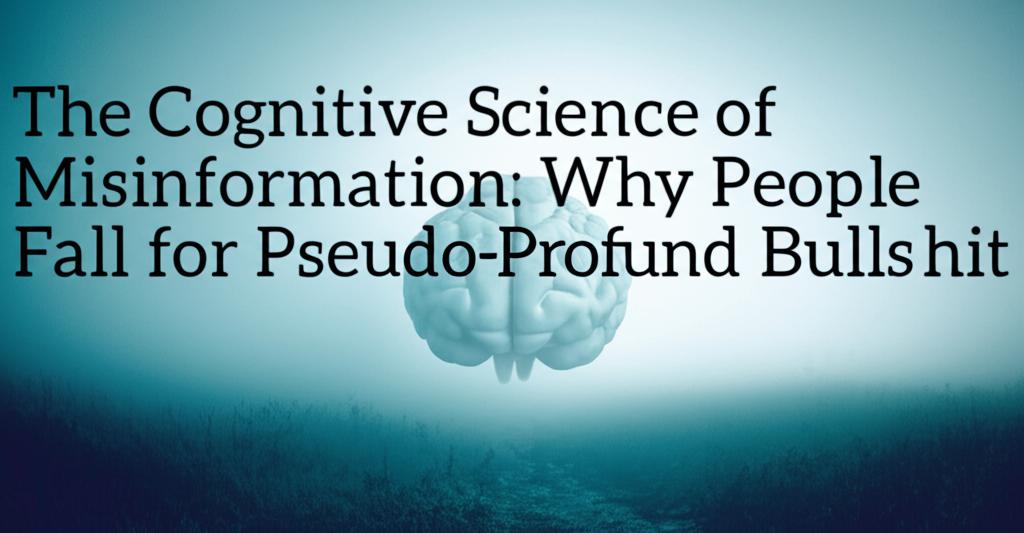In an era of information overload, it's becoming increasingly challenging to distinguish genuine insights from what's termed "pseudo-profound bullshit." These are statements that appear deep and meaningful on the surface but are essentially vacuous, lacking any real substance or verifiable content. Think of phrases like, "Hidden meaning transforms unparalleled abstract beauty" – it sounds insightful but conveys nothing concrete. Understanding why people fall for such statements is a growing area of interest in cognitive science, especially as this susceptibility can influence beliefs, promote misinformation, and even affect health and political decisions.
Recent research, including a meta-analysis of 46 experiments published between 2015 and 2023 involving over 13,600 participants, sheds light on the psychological traits linked to a higher receptivity to pseudo-profound bullshit. The findings consistently show that individuals with lower cognitive abilities, including lower scores on measures of cognitive reflection, verbal intelligence, and mathematical ability, are more likely to be taken in by these meaningless yet grand-sounding statements.
Beyond cognitive ability, a greater faith in intuition also correlates with higher bullshit receptivity. People who rely more on their gut feelings than on analytical thinking tend to find more profundity in these statements. This receptivity is also linked to a stronger belief in paranormal phenomena, conspiracy theories, and religion. Furthermore, individuals who are more prone to "ontological confusions"—such as believing that thoughts can physically influence objects—also rate pseudo-profound statements as more meaningful, suggesting that a blurred line between abstract and concrete concepts plays a role.
The tendency to be swayed by pseudo-profound bullshit isn't just an isolated quirk; it's connected to other cognitive patterns and behaviors. For instance, research has found that people more receptive to bullshit are also more likely to:
- Find depth in simple, inspirational quotes, even if those phrases lack substance.
- Overestimate their own creativity.
- Exhibit poorer metacognitive accuracy, meaning they are less able to accurately assess their own cognitive processes and performance.
- Be less likely to engage in charitable giving, suggesting a potential link between bullshit receptivity and social behavior.
- Endorse and use alternative health practices, like essential oils, without sufficient scrutiny of evidence.
It's important to note that the act of "bullshitting" itself—making statements with little concern for the truth—is also being studied. Research differentiates between persuasive bullshitting (intended to impress) and evasive bullshitting. Interestingly, the frequency with which individuals engage in persuasive bullshitting has been found to positively predict their own susceptibility to various types of misleading information.
Cognitive shortcuts, known as heuristics, also play a significant role in why people accept misinformation, including pseudo-profound bullshit. In our fast-paced digital world, we often rely on mental shortcuts to make quick judgments. While often useful, heuristics like confirmation bias (favoring information that confirms existing beliefs) and the availability heuristic (being swayed by information that is easily recalled, like a viral post) can make us vulnerable to false information. When we rely on these shortcuts, critical thinking can take a backseat. Repeated exposure to a statement, even if false, can increase its perceived accuracy due to the "fluency heuristic"—our brains subconsciously use prior exposure as an indicator of truth.
Moreover, cognitive dissonance—the discomfort experienced when encountering information that contradicts our beliefs—can lead people to reject credible information. Motivated reasoning is another factor, where individuals use their reasoning skills to arrive at a desired conclusion rather than the truth.
While much of the research has been conducted in Western countries, these findings offer significant insights into the cognitive underpinnings of why pseudo-profound bullshit and misinformation can take hold. Understanding these mechanisms is a crucial first step in developing strategies to foster critical thinking and reduce susceptibility to misleading claims. Some research suggests that prompting "explanatory reflection"—critically thinking about and being able to explain one's reasons for beliefs—can reduce receptivity to pseudo-profound bullshit. Awareness of specific cognitive biases, like confirmation bias, has also shown promise in reducing susceptibility to misinformation, particularly among those with initially negative attitudes towards a given topic.

